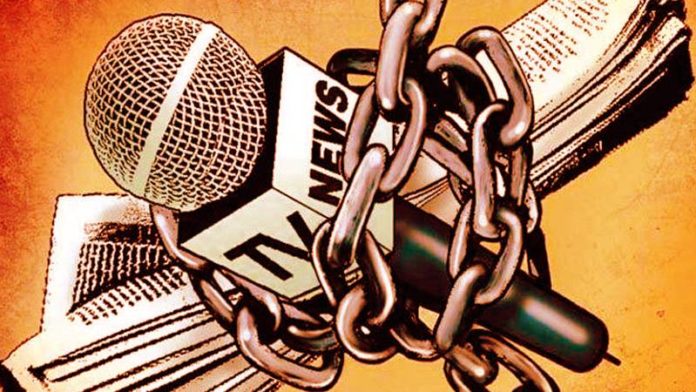The article discusses the severe decline in press freedom in Pakistan, highlighting its fall in the World Press Freedom Index, and emphasizes the persistent control exerted by political and military powers over the media, undermining the constitutional guarantees of free speech.
Press freedom has been on a resounding downward spiral worldwide over the past decade. Unsurprisingly, the ostensibly positive global perspective on democracy falls flat in the face of declining journalistic freedom. Even the most self-appointed, widely accepted democracies have unapologetically taken to thoroughly suppressing fact-based media per their own carefully crafted political agendas.
Freedom of speech in the Pakistani press remains a vexing conundrum. According to the 2024 World Press Freedom Index published by Reporters Sans Frontières (RSF or Reporters Without Borders), Pakistan has dropped to 152nd place this year, down from 150th in 2023, out of 180 countries. Since the country’s independence in 1947, the essence of press freedom in the country has continually been thrown back and forth between the need for greater freedom and the incessant control exerted by political and military powers for state gains.
Looking back at the annual report by RSF, within the South Asian region, Nepal has shot up from 95th in 2023 to 74th this year—an astounding increase in rank, which ultimately demonstrates its capability in trying to keep the intricacies of democracy in the state alive. Despite being widely classified as a least developed country by the United Nations, it undoubtedly comes as a pleasant surprise to see that Nepal is the only South Asian country to be recognized as a nation that overtly disseminates the utmost prominence of press freedom. The fact that Nepal, being one of the few nations globally, declared full freedom of the press as a preface to its constitution is a striking feat. It exudes a type of determination that is necessary, at least as a start, for all global powers to not just demonstrate but to vigorously act on.
Putting Pakistan and Nepal next to each other on the criteria of press freedom could bring about a cause for concern. For one, Pakistan is considered a developing country, unlike Nepal, so how is it that their political ideals can have such an ironclad chokehold on freedom of speech? How do these controls impact the country’s economic and social spheres? Though the focus is on press freedom in Pakistan, the holistic situation surrounding the state is equally telling. Compared to Nepal’s overt expression of press freedom, freedom of speech, and the right to information and privacy, Pakistan has yet to adopt a similar mindset to ensure the protection of press rights.
Conversely, while there is no denying that Nepal has had, and continues to have, cases of conflicts of interest where journalistic ventures and journalists themselves are at the mercy of powerful figures, it is still continuously striving to hand full autonomy to the press, regardless of several obstacles that never cease to create problems in this particular endeavor. Its politicized society poses a constant threat to journalistic freedom, yet its resolve to persistently accommodate journalists—in every way possible—is a notion that necessitates applauding, no matter how long the effect may actually take.
On the surface, Pakistan’s political parties advocate for press autonomy despite their diverse ideologies and the country’s inherent political instability. However, their support often falters the moment any of these parties come into power and attempt to ‘take control’ over state affairs. As highlighted by the RSF, “no matter their ideology, political parties support freedom of the press, but they are incapable of defending it when they come to power, due to the control of the military over the country’s affairs.”[i]
The question of where the idea of press freedom stands in Pakistan has a straightforward answer: it goes nowhere. The idea that there are professionals committed to delivering every piece of information, regardless of context, to the citizens of Pakistan, is a paradox that certain non-democratic forces refuse to entertain. In any genuine democracy, including those celebrated worldwide, where do journalists’ rights truly lie? The pungent reality in Pakistan is that despite laws against spreading misleading information and media bias as per constitutional amendments, there exists a strong tendency to censor press and media outlets that strive to present unfiltered truth. If information does not serve the interests of those in power, it is often suppressed. Thus, while Article 19 of the 1973 constitution theoretically guarantees freedom of speech and expression, the actual practice in Pakistan often undermines these rights, mainly at the hands of the mighty rulers and plenipotentiaries.




